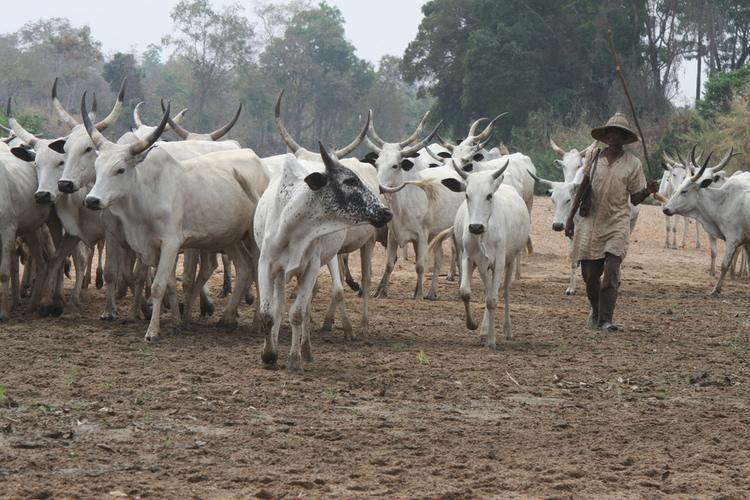
The government of President Bola Tinubu has declared that 417 grazing reserves will be rehabilitated nationally, citing open grazing as a primary contributing factor to the frequent conflicts between farmers and herders in Nigeria.
The strategy is a crucial part of a new agenda for livestock transformation that aims to modernize the industry and lower insecurity.
At the National Council on Livestock Development’s (NCLD) first meeting, which took place on Monday, November 24 at the Government House Banquet Hall in Yola, Adamawa State, Minister of Livestock Development Idi Mukhtar Maiha reportedly said this.
He saw the event as a turning point in efforts to create a system that is peaceful, productive, and sustainable as well as a historic shift in Nigeria’s livestock future.
“Open Grazing’s Era Is Over”
The foundation of the government’s new strategy, according to Maiha, is moving Nigeria away from open grazing, which he called antiquated and prone to conflict.
The only long-term answer to the farmer-herder conflict, in his opinion, is the restoration of grazing areas into fully furnished Renewed Hope Livestock Villages.
“The open grazing age is unsustainable and a major cause of ongoing conflict. The only solution to the farmer-herder dispute is to transform the 417 grazing reserves into contemporary Renewed Hope Livestock Villages, he stated.
With better pastures, veterinary care, water infrastructure, schools, clinics, dairy and beef processing facilities, and renewable energy produced by biogas systems, he clarified, each restored reserve will function as an economic center.
He stated that since modern ranching ensures security, stability, and increased output, state governments would have to set aside territory for pastoralists who are willing to adopt it.
Under the direction of the National Livestock Growth Acceleration Strategy (NL-GAS), the one-year-old Ministry of Livestock Development has made notable success, according to the minister.
He clarified that by enhancing genetics, boosting productivity, and bolstering value-chain investments, the strategy aims to grow the livestock business from its present $32 billion to $74 billion within five years.
For the first time in almost 50 years, the nation just registered eight new grassland species, according to Maiha. Additionally, he announced the creation of a national genetic resources strategy and a significant increase in the National Veterinary Research Institute’s (Vom) yearly output of vaccines, from 120 million to 850 million doses.
He added that collaborations with international dairy giants like Nestlé, Arla Foods, Danone, Promasidor, and FrieslandCampina WAMCO have been crucial in helping the nation double its yearly milk production from 700,000 to 1.4 million metric tons, and that the creation of the Wase Livestock Village has become a model for restoring national grazing reserves. According to him, the L-PRES project’s solar-powered boreholes, cattle dips, veterinary clinics, slaughter slabs, and milk collection facilities are already helping a number of states.
Maiha argues that in order to avoid impeding progress, all states must adopt a single national strategy for cattle reforms. The livestock industry faces problems that cut across state lines. “We need to apply NL-GAS consistently,” he stated.
The National Assembly Supports Reforms
In his message of goodwill, Tasir Olawale Raji, the chairman of the House Committee on Livestock Development, stated that the legislature completely supports the reform objective of the federal government.
He cautioned that Nigeria’s livestock production is still much below what is needed domestically, making the nation heavily dependent on imports.
Nigeria presently imports 65% of the milk eaten domestically, according to Raji, who also noted that the nation’s annual per capita consumption of 8.7 liters of milk, 9 kg of beef, and 45 eggs is much lower than the world average.
In order to modernize production systems, improve value addition, and draw in more private sector investment, he continued, the National Assembly is developing new legal frameworks.
Raji expressed confidence that the NCLD will play a crucial role in expediting the Renewed Hope Agenda and invited stakeholders to provide workable suggestions that would unlock the sector’s full economic potential.
Dr. Chinyere Ijeoma Akujobi, the Ministry’s Permanent Secretary, called the first council meeting a turning point in Nigeria’s livestock transformation process. According to her, the recently established NCLD will serve as the top national policy and coordinating authority for directing livestock development nationwide.
She claims that the livestock industry continues to be a key component of President Bola Tinubu’s Renewed Hope Agenda.
In order to create a contemporary and competitive cattle industry, she said the council will fortify alliances, harmonize regulations, and spur innovation.
Akujobi also praised development partners, especially Propcom, for their contributions, stating that they will enable the production of wealth, enhance livelihoods, and create a robust cattle sector.